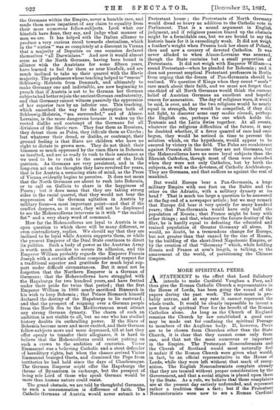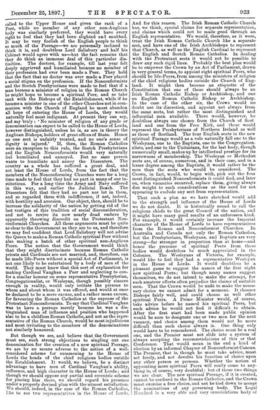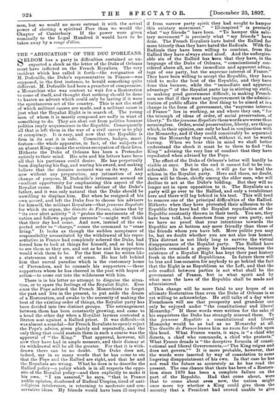MORE SPIRITUAL PEERS.
ASTATEMENT to the effect that Lord Salisbury intends to make Cardinal Vaughan a Peer, and thus give the Roman Catholic Church a representative in the House of Lords, has been going the round of the papers during the past week. The statement is pro- bably untrue, and at any rate it cannot represent the whole truth. It would be clearly impossible to invent a new form of spiritual Peer for the benefit of the Roman Catholics alone. As long as the Church of England remains the Church by law established a good case may be made out for confining the spiritual Peerage to members of the Anglican body. If, however, Peers are to be chosen from Churches other than the State Church, it is clear that they cannot come only from one, and that not the most numerous or important in the Empire. The Protestant Nonconformists and the Church of Scotland would most naturally feel it unfair if the Roman Church were given what would, in fact, be an official representative in the House of Lords, while they were left without that mark of recog- nition. The English Nonconformists complain already that they are treated without proper consideration by the Government, and that a social stigma is placed upon them by the State. As a rule, we believe that these complaints are at the present day entirely unfounded, and represent rather a tradition than a fact; but if the Protestant Nonconformists were now to see a Roman Cardinal called to the Upper House and given the rank of a Peer, while no member of any other non-Anglican body was similarly preferred, they would have every right to feel that they had been slighted and snubbed. It may be very foolish of the English people to think so much of the Peerage—we are personally inclined to think it is, and doubtless Lord Salisbury and half his Cabinet would agree with us—but the fact remains that they do think an immense deal of this particular dis- tinction. The doctors, for example, till last year felt deeply aggrieved and humiliated because no member of their profession had ever been made a Peer. They held that the fact that no doctor was ever made a Peer placed a social stigma on the profession. If the Nonconformists and the Scotch Presbyterians were made to feel that if a man became a minister of religion in the Roman Church be might hope to become a spiritual Peer, and so take rank with the Bishops of the Establishment, while if he became a minister in one of the other Churches not in com- munion with the Church of England he must abandon all hope of entering the House of Lords, they would naturally feel most indignant. At present they can say, and say truly No minister of religion of any grade or denomination can expect to be called to the House of Lords, however distinguished, unless he is, as are in theory the Anglican Bishops, holders of great offices of State. Hence no one sect is unfairly treated, and no one's sense of dignity is injured.' If, then, the Roman Catholics were an exception to this rule, the Scotch Presbyterians and the English Nonconformists would very naturally feel humiliated and annoyed. But no sane person wants to humiliate and annoy the Dissenters. The country as a whole has suffered a great deal, and not least the House of Lords, from the fact that the members of the Nonconforming Churches were for a long time made to feel that they had no part in many of our in- stitutions. For a long time the Army and Navy suffered in this way, and earlier the Judicial Beach. The Dissenters felt that they had no part nor lot in them, and so regarded them with indifference, if not, indeed, with hostility and aversion. Our object, then, should be to increase the solidarity of the nation by getting rid of the last vestiges of this tradition of social disconsideration, and not to revive its now nearly dead embers by apparently throwing discredit on the Protestant Non- conformist Churches. All these arguments must be quite as clear to the Government as they are to us, and therefore we may feel confident that Lord Salisbury will not advise the Queen to make a Roman Catholic spiritual Peer without also making a batch of other spiritual non-Anglican Peers. The notion that the Government would think that they might discriminate because Roman Catholic priests and Cardinals are not married, and, therefore, can be made life-Peers without a special Act of Parliament, is not one likely to be entertained by a body of men of the world. They must know that this sort of explanation for making Cardinal Vaughan a Peer and neglecting to con- fer a similar honour on some representative Presbyterian, Congregationalist, or Wesleyan, though possibly sincere enough in reality, would only irritate the persons to whom and about whom it was offered, and would at once be declared to be a mere excuse, and a rather mean excuse, for favouring the Roman Catholics at the expense of the Protestant Nonconformists. To say that Cardinal Vaughan was to have a peerage merely because he was a dis- tinguished man of influence and position who happened also to be a childless Roman Catholic, and not as the repre- sentative of the Roman Church, would be most injudicious and most irritating to the members of the denominations not similarly honoured.
But though we see, and believe that the Government must see, such strong objections to singling out one denomination for the creation of a new spiritual Peerage, we are by no means adverse to the notion of a well- considered scheme for summoning to the House of Lords the heads of the chief religious bodies outside the Establishment. It would, we believe, be a distinct advantage to have men of Cardinal Vaughan's ability, influence, and high character in the House of Lords ; and though we should oppose any partial and eccentric scheme for placing him there, we should regard his presence under a properly devised plan with the utmost satisfaction. We should, indeed, in the case of the Roman Catholics, like to see two representatives in the House of Lords. And for this reason. The Irish Roman Catholic Church has, we think, special claims for separate representation, and claims which could not be made good through an English representative. We would, therefore, as it were,. treat the Irish Roman Catholic Church like a separate sect, and have one of the Irish Archbishops to represent.
that Church, as well as the English Cardinal to represent. the English and Scotch Roman Catholics. In dealing with the Protestant sects it would not be possible to draw any such rigid lines. Probably the best plan would. be to empower the Crown by an Act of Parliament, drawn in very general terms, to appoint eight spiritual Peers, who- should be life-Peers, from among the ministers of religion of the chief religious bodies outside the Church of Eng- land. It might then become an etiquette of the Constitution that one of these should always be an Irish Roman Catholic Bishop or Archbishop, and one an English Roman Catholic Bishop or Archbishop. In the case of the other six, the Crown would no doubt use its discretion, and appoint not always from the same sects, but rather the most distinguished and influential men available. There would, however, be doubtless always one chosen from the Church of Scot. land and one from the Free Kirk, and these would represent the Presbyterians of Northern Ireland as well as those of Scotland. The four English seats in the new spiritual Peerage would as a rule naturally fall one to the Wesleyans, one to the Baptists, one to the Congregation- alists, and one to the Unitarians, for the last body, though numerically small, makes up by intellectual prestige for its narrowness of membership. The Wesleyan or Methodist sects are, of course, numerous, and in their case, and in a lesser degree among the Baptists, it would rather be the men than the sects who would be considered. The Crown, in fact, would, to begin with, pick out the foul most distinguished Nonconformists it could find, and later on, when vacancies occurred, replace them, giving always due weight to such considerations as the need for not appearing to exclude any sect from representation.
That such a plan as we have sketched would add to the strength and influence of the House of Lords we do not doubt. It is historically sound to call the religious chiefs to the great Council of the nation, and it might have many good results of an unforeseen kind. For example, it would certainly increase the Imperial character of the House of Lords to have representatives from the Roman and Nonconformist Churches. In Australia and Canada not only the Roman Catholics, but the Presbyterians, Wesleyans, and Baptists are very strong—far stronger in proportion than at home—and hence the presence of spiritual Peers from these bodies would doubtless be much appreciated in the Colonies. The Wesleyans of Victoria, for example, would like to feel they had a representative Wesleyan in the House of Lords. It would doubtless be a pleasant game to suggest the names of the first eight new spiritual Peers ; but though many names suggest themselves, we do not intend to make the attempt, for such amateur efforts often prejudice the claims of suitable men. That the Crown would be unfit to make the neces- sary choice we cannot admit for a moment. It chooses Bishops fairly well, and could choose as well other spiritual Peers. A Prime Minister would, of course, take advice before he named his spiritual Peers, but such advice he would not find it difficult to obtain. After the first start had been made public opinion would be sure to designate one or two men for the next vacancy, and choice among them would not be more difficult than such choice always is. One thing only would have to be remembered. The choice must be a real one, and the Premier must not slide into a system of always accepting the recommendations of this or that Conference. That would mean in the end a kind of election by an informal Chapter of Nonconformist Canons. The Premier, that is, though he must take advice, must act freely, and not devolve his function of choice upon any other person or persons. Whether the notion of appointing more spiritual Peers will really come to any- thing is, of course, very doubtful ; but of these two things we are clear. The new spiritual Peerage, if it is created, cannot be confined to the Roman Catholics, and the Crown. must exercise a free choice, and not be tied down to accept the nominations of any governing body. The Legal Hundred is a very able and very conscientious body of men, but we would no more entrust it with the actual power of electing a spiritual Peer than we would the Chapter of Canterbury. If the power were given nominally to the Legal Hundred it would have to be taken away by a conga d'aire.




































 Previous page
Previous page